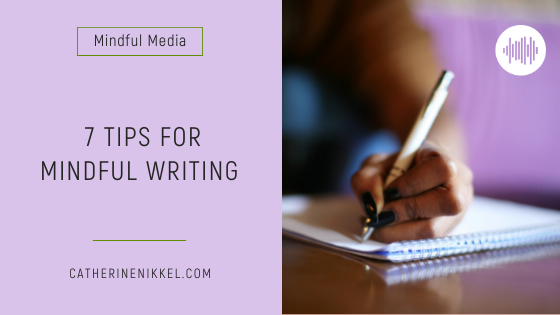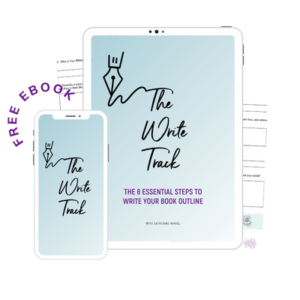The concept of mindfulness and/or mindful writing, is all the rage these days, but what does it really mean? Becoming more mindful forces us to become more aware of the thoughts, feelings, and emotions we have on a day-to-day and moment-to-moment basis. When you tune into your emotions and thoughts, it forces you to be more conscious of how those feelings influence your attitude and actions.
Hear me out …
Mindfulness means being an observer of the thoughts and feelings that pass through your head without being judgmental or trying to control them. For example, becoming more mindful might mean that you come to recognize that at a certain time of day, you become super tired or negative. Understanding this can help you live in the moment and accept life as it happens.
When it comes to writing, mindfulness can be extremely beneficial. It differs completely from most of the writing you’re probably currently doing — whether that’s writing an email, crafting a written document for work, or trying to coordinate plans with a friend over text. While all of those practices typically require careful thought and grammatical expertise, mindful writing on the other hand is freestyle and should just be mind to pen to paper.
All mindful writing requires is you to be present and focus on your current thoughts, feelings, and emotions. By letting your mind guide your writing, it can help improve your overall creativity and writing ability.
Here are 7 ways you can Practice Mindful Writing:
1. Set a Timer
Mindful writing doesn’t mean you have to sit down at your computer and write for hours on end. Instead, try setting a timer for 20-30 minutes and just write out whatever thoughts and feelings arise.
2. Don’t Have a Goal
If you sit down with the intention to write about a certain topic, that’s not mindful writing. Each time you sit down, you should focus on writing about whatever comes to mind — and if that brings about a certain topic or theme, so be it — but don’t marry yourself to one idea.
3. Silence Notifications
The purpose of mindful writing is to be present in the moment without distractions. Your phone might ring, a notification might buzz, or someone in your household might call out for you. As much as possible, try to eliminate these distractions — turn your phone on do not disturb and ask your housemates to not bother you for a certain amount of time.
4. Get into a Routine
Depending on the person, your ideal time to write will vary. For some, it might be first thing in the morning; for others, a mid-afternoon journaling session works best. No matter what your optimal time to sit down and write is, get into a routine. By practicing mindful writing on a consistent basis so that it becomes routine, it will become harder to put off.
5. Take Deep Breaths
Before you start writing, take a couple deep breaths. Root yourself in the current moment and really tune in to yourself — you’ll be amazed at how beneficial it is.
6. Don’t Force It
I’m sure we’ve all come across writer’s block from time to time, where we just can’t get into the writing headspace. Sometimes that happens, and while sometimes it can be beneficial to push past it when practicing mindful writing, you also don’t need to force it. Know that sometimes it’s okay to reschedule — just don’t make a habit out of it!
7. Let Go of Perfection
When it comes to mindful writing and just mindfulness in general, there is one thing that has no place: perfection. There is no such thing as perfect, so let go of the idea that you need to be perfect or write perfectly in order to create interesting work. Just let the writing flow and don’t worry about anything else!
Let’s make some Mindful Media, shall we?
Resources
Join The Storytellers Café – My free training community to help you create an impact through your story
Enrol in The 5-Day Content Experience – Learn how to repurpose your content like a pro…in 5 minutes a day!

Email: catherine@catherinenikkel.com
Facebook: https://www.facebook.com/profitablestories/
Need help telling your story in your own voice? Let’s make it happen. Schedule a consultation with me here






